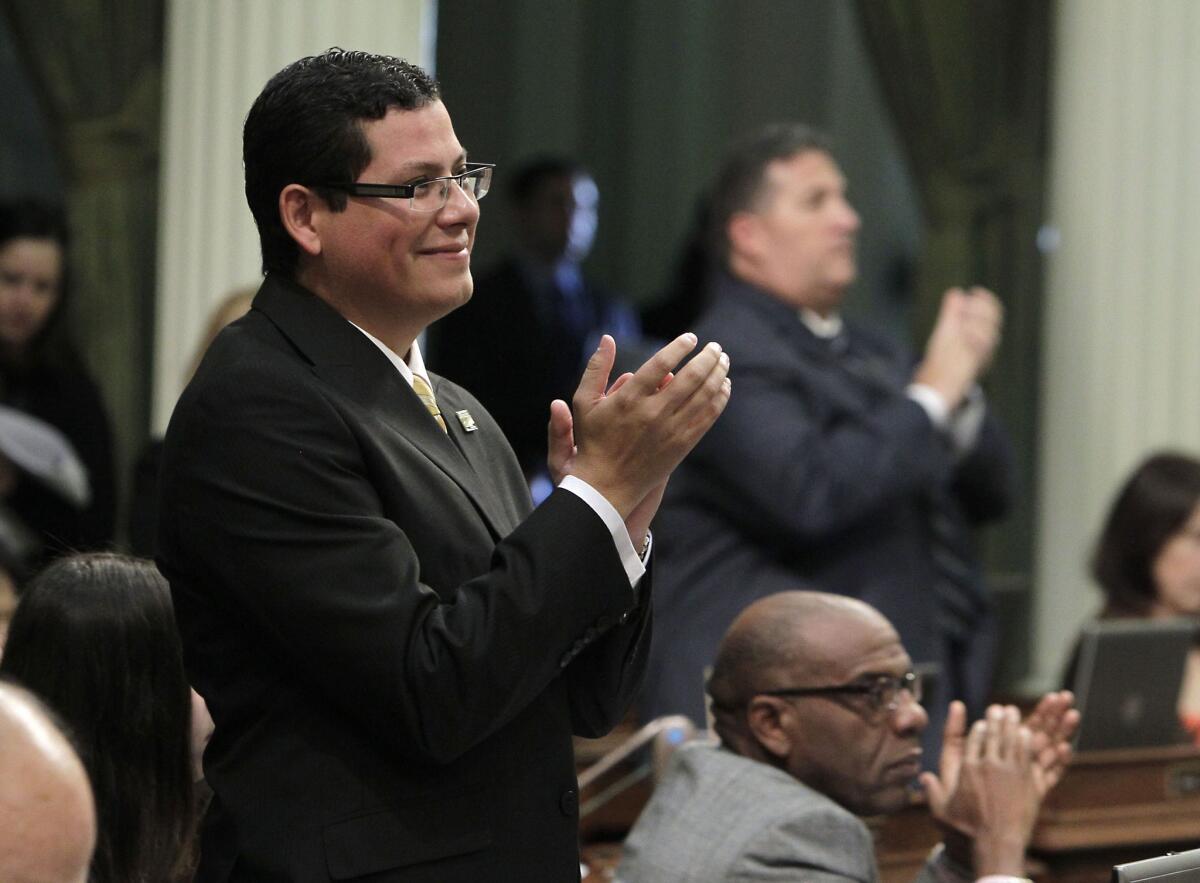
Assemblyman Rudy Salas, D-Bakersfield, will be one of the leaders of a group of moderate Democrats.
The informal but increasingly powerful cadre of business-aligned Democrats in the Legislature tapped two assemblymen to lead their caucus Tuesday afternoon after last week’s decision by the group’s current chairman to leave office at the end of the month.
Assemblymen Jim Cooper (D-Elk Grove) and Rudy Salas Jr. (D-Bakersfield) now share top billing of the so-called Moderate Caucus.
The new leadership framework, which was made official by a vote of centrist Democrats during their retreat at the Lodge at Torrey Pines golf resort in San Diego, underscores how the “Mods’” political apparatus has matured as its ranks have swelled.
“As the group has continued to evolve and grow, co-chairs make sense because of the amount of work that needs to be done in the state of California,” Salas said in an interview.
Nearly two dozen lawmakers, primarily from the Assembly, joined operatives and lobbyists for oil companies, insurance agents and other business interests for the two-day gathering that began Tuesday.
The group has increasingly flexed its muscle in major Capitol debates on labor, healthcare and environmental policy in recent years. Its power was most apparent in the standoff over a sweeping climate change proposal backed by Sen. Kevin de León (D-Los Angeles) and Gov. Jerry Brown this year. Centrist holdouts in the Assembly were instrumental in whittling down the measure, axing a provision that would have slashed gasoline use on state roads.
For all its clout, though, the Mod Caucus remains enigmatic. There’s no official roster of members — the group declined to provide a list of attendees to the Torrey Pines confab — and the ranks of the caucus ebb and flow depending on the issue. That secrecy extends even to its new leadership structure. As co-chairs, Salas and Cooper will divvy up responsibility for its political operations and legislative policy, but Salas declined to specify who would do what.
The affiliations may be informal, but its Capitol presence is anything but. The coalition has a sophisticated political operation, with outside consultants and a fundraising committee that can accept unlimited donations. So far this year, the group has collected nearly $700,000 from business interests, including $100,000 from Chevron and $50,000 from Wal-Mart.
For the first time, two members will share leadership responsibilities for the group. Both men were elected under term-limit rules that were approved by voters in 2010, allowing them to continuously serve as long as 12 years.
“We work great together,” said Salas, who said that under their leadership, the guiding principles will be “how are we growing the middle class, how are we growing the economy, how are we bringing accountability and transparency back into government.”
Salas, 38, logged time as a legislative staffer before serving on the Bakersfield City Council for two years. He was elected to the Assembly in 2012 and is termed out in 2024.
Cooper, 51, was a former captain in the Sacramento Sheriff’s Department before he was elected to the Assembly in 2014. He is termed out in 2026.
Assemblyman Henry Perea (D-Fresno) led the caucus since 2012. Last week, he announced he would step down from his seat a year before completing his final Assembly term to take a government relations job. He declined to say where he’d be going.
Noting the evolution of the centrist group, Perea recalled how business-friendly Democrats had an openly frayed relationship with the more liberal wing of their party, including one famous incident in 2007 when then-Senate leader Don Perata (D-Oakland) locked three Senate Democrats out of their office as punishment for raising funds for the moderate caucus.
“That’s not happening any more,” Perea said. “The Mods have matured, become more sophisticated and more relevant, and are playing a leading role in shaping California’s policies.”
But acrimony with the party’s left flank hasn’t subsided. Environmental groups, stung by the fight over the climate change bill, have dubbed the group the “Oil Caucus.”
“You can’t call yourself pro-business, when you’re on the wrong side of the fast growing clean energy industry while voting in lockstep with Big Oil,” said Steven Maviglio, a Democratic consultant who works with labor and environmental groups. “Hopefully these assemblymembers will get this and will side with what’s good for their districts rather than with the oil companies.”
Maviglio said the group should not just work to block bills, but should also propose policy initiatives of its own.
“It’s one thing to be the Caucus of No,” he said. “It’s another to actually have legislative accomplishments.”
For more on California government and politics, visit latimes.com/politics and follow @melmason
ALSO
Leader of legislature’s moderate Democrats resigning
This Democrat’s decision on climate change could be a game changer
The inside story of how power struggles doomed Jerry Brown’s top priority
California GOP sitting out Senate race in conservative-leaning swing district